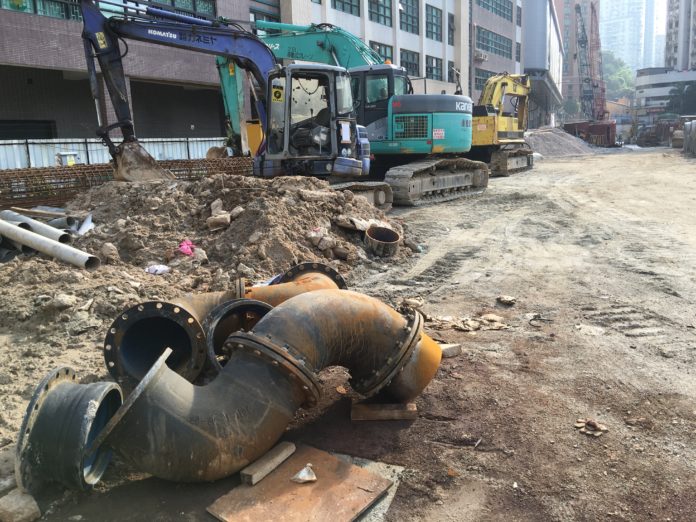The Commission of Audit (CA) has slammed both the Road Construction Co-ordination Group as well as the Civic and Municipal Affairs Bureau (IACM), pointing to ineffectiveness and lack of supervision of road construction work, leading to multiple cases of re-excavation of the same location over a two-year period.
The city’s Transport Bureau (DSAT) announced last year in December that more than 1,000 road construction works were to take place in 2017.
However, the CA’s report revealed that there were a total of 3,458 road construction projects during the years of 2014 and 2015, of which 3,257 were private road projects – accounting for 94.19 per cent – and 201 were public projects.
‘The recent road constructions are not happening within a short period of a specific developmental stage, but a long-term issue which affected different areas […] constantly affecting the livelihood of local residents,” the audit department wrote in its latest report released yesterday. ‘The reckless repetition of excavations [in Macau] is absolutely unique to Macau.’
The CA also denounced both frontline staff and management teams of related public departments for brushing off their responsibilities, which resulted in the burden being born by the public.
IACM director José Tavares told local broadcaster TDM that four inspectors are now being reviewed after the CA report, noting that they had already been transferred to other departments last year due to not following IACM demands regarding supervision. The director said he was “surprised” by the results and awaits the results of the investigation.
The director of DSAT also told the broadcaster that “some work projects were urgent and had to be commenced immediately. If others are not as urgent, we tried to carry them out at different periods,” noting at the time that he had not yet read the whole report.
Effective?
According to the latest report released by the CA, the co-ordination group – set up by the High Committee of Transportation in 2009 and managed by the Secretary for Transport and Public Works – was tasked with reducing the traffic issues and inconvenience created during construction periods. The report notes that the group ‘did not confirm’ whether there were cases of works happening twice in the same place over the two-year period, and ‘doesn’t have the capacity to verify and hold accountable its members in following the projects’ scheduling’.
Meanwhile, the CA criticised IACM for its poor supervision of construction project approvals, including having an obscure definition for construction work happening in the same spot and incomplete information of construction projects, despite utilising GIS (Geographic Information System) for over a year – set up to help monitor progress.
There were also cases of approving construction projects in locations where other construction work was still ongoing, without paying the two licencing fees, leading to re-excavation within two years.
For instance, as revealed by the CA, a total of 25 construction projects happened on Rua Nova à Guia during the two-year period in question.
The audit department disclosed that the co-ordination meetings, which are held once a week, would only coordinate construction projects for the upcoming month and failed to administer punitive measures that are granted by the law.
IACM also failed to follow-up and ensure that construction projects had abided by the co-ordination results.
‘Many personnel and resources were being utilized for the co-ordination mechanism but the mechanism itself failed to reach the expectations of the government and the residents,’ wrote the report.
Poor supervision
The audit department also spot-checked 36 projects which had exceeded their initially approved construction periods, with some of the projects being delayed for two days to as many as 72 days, with a total overall delay impact of 1,019 days.
In compliance with the organisational structural rules of IACM, and the rules for public areas, IACM has the responsibility of overseeing the execution of construction projects, but instead, the public department ‘left them unchecked for a long period of time,’ the report states.
In terms of examining extension requests during construction periods, there are no requirements to present the reasons for an extension application. There is also an absence of guidelines for determining the allowance of maximum duration length of the construction period, it notes.
IACM, moreover, allowed the renewal of applications after the completion of construction, meaning that IACM forwent the control over applications for extending constructions, reports the body.
Ambiguous calculations of construction periods
The audit report, meanwhile, revealed that IACM does not have any specifications regarding official calculations for the exact construction period for every project.
‘The completeness and the accuracy of the “Inspection Record” is doubtful,’ wrote the CA, adding that such performance would not be able to encourage early completion of construction work.
The audit watchdog also discovered cases in which inspectors from IACM had skipped the inspections made by superiors of the department, resulting in IACM having difficulty in resolving any cases that had passed their deadlines.
Among the aforementioned selection of 36 projects, 11 had their construction approvals expire and suffered no penalties, leading the MSAR Government to incur a loss of MOP107,160 (US$13,363).
Audit’s suggestions
In the report, the Commission urged the related public departments to prioritise minimizing the impact of road construction projects on residents.
The CA suggested re-examining the permission approval system and the co-ordination meetings for short-term improvements.
For medium or long-term solutions, the report recommended the use of scientific analysis to reduce the frequency of construction projects, as well as adopting an optimal approach to shorten the days for construction.
More importantly, the audit department urged the re-examination of the procedures for approving and supervising construction periods, adding that it was necessary to create a sufficient mechanism that could ensure effective reduction of construction days.
In agreement
The Transportation Superior Committee responded to the Commission by listing the works that were being carried out by the co-ordination group, while pledging to continue to improve the co-ordination mechanism, as well as the implementation of road classifications and the prevention of two major projects happening simultaneously at the same location.
Meanwhile, IACM also responded and agreed to the report and the suggestions.
IACM assured it ‘will improve and strengthen co-ordination’ and will ‘record consensus made during the co-ordination meeting’.
The public department also vowed to improve ‘details of guidelines on approval of construction permissions, to require the submission of concrete construction plans, to ensure adequate reasons for the renewal applications and mandate that they be submitted prior to the expiration’.
Regarding the performance of inspectors, IACM will strengthen the monitoring of inspectors and status of construction projects through the implementation of an e-supervision system and e-records, it told the body.
























